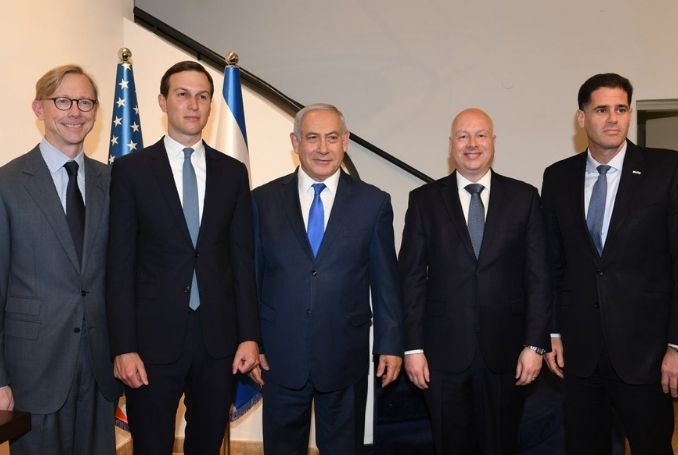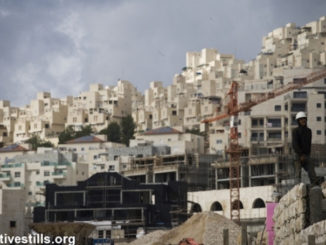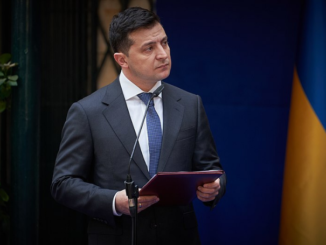
Bahrain hosted the economic version of the so-called Deal of the Century. A two-day conference, co-hosted by the United States, was held in the capital, Manama, on June 25-26.
The Palestinian leadership has rightly refused to take part in the latest US-Arab charade, which aims at normalizing Arab-Israeli ties at the expense of Palestinian rights.
Despite the fact that some have tried to present Bahrain ‘workshop’ as a purely ‘economic effort,’ White House officials have been clear that this was the first stage in their supposed peace plan.
For the Trump administration, the Manama meeting served as the first step in a larger strategy that aims to undermine international law regarding Palestine and the inalienable rights of the Palestinian people.
Instead, the conference tied to offer a version of Israeli Prime Minister Benjamin Netanyahu’s ‘economic peace’, as in the normalizing of the Israeli occupation of Palestine in exchange for a degree of Palestinian ‘economic prosperity.’ Needless to say, Trump’s ‘economic peace’ is also doomed to fail.
The choice of Bahrain as the center of the latest American gambit is a strategic move, as it fits into a broader context of the ongoing normalization between Arab countries and Israel.
US-Israeli politicking, however, aims at more than normalizing the Israeli occupation among Arab countries. It also intends to change the status quo of Arab centers of political and spiritual power as well.
But the story of normalization has long preceded Trump and his administration.
Indeed, the US – which became more actively involved in the Middle East region starting with the massive military buildup preceding the Kuwait war in 1990-91 – understood that normalization between Israel and its Arab allies should top its regional priorities. These efforts succeeded to an extent, culminating in the direct Arab-Israeli peace talks in Madrid in 1991, then the Oslo Accords in 1993 and the Israel-Jordan Peace Treaty in 1994. These agreements largely took place outside international law.
Normalization efforts continued since then, sometimes openly in the form of Arab-Israeli exchanges of sports and business delegations, and sometimes secretly involving diplomats and intelligence chiefs.
The normalization campaign slowed down significantly during the Barack Obama administration, not for the lack of trying but because of the seismic geopolitical shifts in the regions in the last decade. The disastrous outcomes of the US invasion of Iraq and political remapping of the Middle East since Arab revolts in 2011 forced a change in US priorities, a fact that angered US allies, especially Israel and Saudi Arabia.
As Iran gained greater influence, and with Russia staking new claims in the region, Washington was accused of failing its allies. Long before early signs of normalization began appearing between Saudi Arabia and Israel, both countries had one cause in common, immense frustration with the Obama Administration that seemed to operate in the region with an indecisive doctrine of crisis management and bashful interventions.
Netanyahu and his Washington allies, for example, found it shocking that Obama was still talking of illegal settlement freeze rather than preparing for war against Iran. The nuclear deal reached between international powers and Iran in 2015 was particularly unforgivable from an Israeli point of view. The Saudis shared that sentiment. Wary of Iran’s growing influence, Saudi rulers understood that any change to the status quo in the Middle East, which has prevailed since the Roosevelt-Ibn Saud agreement (so-called Quincy Agreement) in 1945, represented a direct threat to their power.
The advent of Trump, an impulsive, erratic and opportunistic president, represented the perfect opportunity for the understated Saudi-Israeli anti-Iran alliance to take shape. His visit to Saudi Arabia on May 20, 2017, and astronomical financial military deals signed with the Kingdom (totaling $350 bn), as well as other Gulf monarchies was the price required for the US to re-engage with the region, this time not driven by any particular American priorities or illusions, but by the stated desire to recreate a Middle East region where Israel, Saudi Arabia and their allies are the main centers of power.
While Arab rulers continued to pay lip-service to Palestine, on February 13-14, Trump advisor and son-in-law, Jared Kushner, along with the ardently pro-Israel Special Middle East Envoy, Jason Greenblatt met in Warsaw with top Arab officials in one of the clearest signs of normalization. The Warsaw Middle East summit did more than merely demonize Iran, but it was an important step in the declaration of the new American order in the Middle East, one in which Israel and some Arab countries, under the leadership of Saudi Arabia will open a new chapter, one in which Palestine is no longer a priority.
But not all Arabs are rejoicing or consenting to the new American agenda. The Jordanian ruling elites are fuming.
The US-Israel plot aims at marginalizing Jordan. In their view, the country is militarily weak and financially reliant on foreign aid. While there is much truth to these calculations, Jordan is likely to put up a fight, for it stands to lose most.
The attempt at disempowering poorer US allies while empowering wealthy Gulf countries could shatter long-standing alliances between Arab countries that have historically been perceived by the US as the ‘moderates’. Jordan has every reason to worry that Washington’s game could jeopardize its standing in Palestine, especially in Jerusalem, which could undermine the Hashemite Kingdom and its claim of regional leadership.
Considering the varying degrees of failure in all previous US initiatives, starting with the Kuwait war in 1990-91, the Deal of the Century is likely to meet the same futile end, especially as it attempts to generate a new political map in a region that is experiencing its greatest upheaval in decades.
At best, the Deal of the Century will allow US, Israel and Arab ruling elites to merely buy time, each for his own domestic benefit.
However, it is also likely to result in the splitting up of an Arab camp that has served as the American vanguard in the Middle East for many years. This could be the US’s greatest political gamble in the region yet.
– Ramzy Baroud is a journalist, author and editor of Palestine Chronicle. His last book is ‘The Last Earth: A Palestinian Story’ (Pluto Press, London). Baroud has a Ph.D. in Palestine Studies from the University of Exeter and was a Non-Resident Scholar at Orfalea Center for Global and International Studies, University of California Santa Barbara. His website is www.ramzybaroud.net







